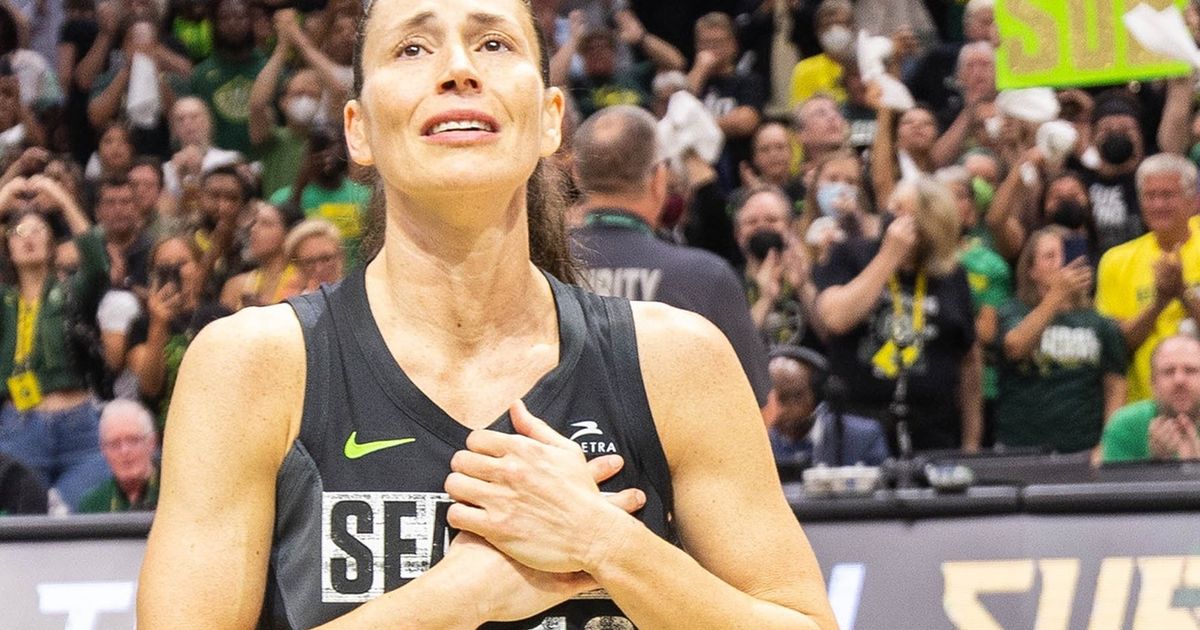
As Sue Bird said goodbye after playing her last game on Tuesday, the fans’ chants of “Thank you, Sue!” “Thank you, Sue!” spoke to her beloved status not just on the court, but off as well.
Bird’s accomplishments in basketball are legendary, with one Sports Illustrated writer calling her the “Emerald City GOAT.”
But Bird’s personal evolution during her 20 years in Seattle has also mirrored the evolution of the WNBA, the Storm and the societal changes in LGBTQ+ inclusion.
When Bird first started in the league in 2002, it was a very different time. Federally recognized same-sex marriage was still 13 years away and LGBTQ+ media representation was limited to shows like “Ellen” and “Will & Grace.”
Back then, players were closeted to protect their careers. As The Athletic wrote in June, the league initially slighted LGBTQ+ fans and marketed heterosexual players to appeal to men. Players were feminized and queer players were pressured to hide their sexual orientation.
In 2008, rookie players were given makeup classes and fashion tips as part of their orientation, in an effort to make them more “marketable.”
Even though the high number of LGBTQ+ players was always an open secret — one that drew legions of lesbian and queer fans to games across the country — the league itself didn’t embrace the very people who filled seats week after week, bought season tickets and were what The New York Times called the “league’s most faithful fans.”
But as more and more players started to acknowledge publicly what was long known privately about their sexual orientations, in 2014, the league finally started to embrace its lesbian and queer fans by launching a marketing campaign targeted directly at LGBTQ+ audiences, the first professional league to do so.
Today, the Storm have embraced an annual “Pride Night” in June as well as participated in Seattle Pride events and partnerships.
Bird, herself, after years of ambivalence about being publicly out, finally acknowledged in 2017 that she was a lesbian and dating soccer superstar Megan Rapinoe.
Storm fan Sarah Morningstar, who attended Bird’s final three games, said Bird’s leadership on social justice issues and her willingness to use her voice for change have been inspiring to watch.
“With great power comes great responsibility, and she’s been flawless. There’s no scandals, there’s no drama,” she said. “She’s just like, ‘I’m Sue Bird. … I play some ball and do some good. I speak up when I need to, because people will listen.’ ”
In 2020, for example, Bird, Rapinoe and Russell Wilson used their platforms to speak out in support of Black Lives Matter at the ESPY awards, Morningstar recalled.
Morningstar, the widow of legendary civic leader Cheryl Chow, said the Storm arena was “instantly a safe place” to be out and proud. “It’s like euphoria in there. You’re in this bubble of OK-ness.”
I know the feeling. The first time I went to a professional women’s basketball game — way back during the American Basketball League’s Seattle Reign era in the late 1990s — I remember never before having seen so many lesbian, queer women and nonbinary people in one place at one time. Even as someone who didn’t follow sports, it felt like coming home.
Bird further solidified her place in the hearts of so many women in the LGBTQ+ community with her farewell speech during her last regular-season game on Aug. 7.
She spoke with affection about her early days at the Wildrose, Seattle’s last lesbian bar, and in a sense spoke to her own transformation around her public identity.
“I remember a couple of years in, some of my teammates wanted to go to the Wildrose, I went with them,” Bird said. “A season-ticket holder was there and put her arm around me and said, ‘Hey, I don’t know if this is the place you want to be.’ On the outside I was like, ‘Oh OK, thanks, good looking out,’ on the inside, I was like ‘I know where I am,’ ” she said with a huge smile.
Wildrose co-owner Martha Manning said that was a full circle moment.
Manning, who has owned the bar about as long as Bird played for the Storm, said that back in the early 2000s, Storm players would come into the Rose, but it was something that was kept under wraps. “It was kind of a ‘don’t ask, don’t tell,’ ” she said. “And they were not encouraged to go to the gay bars for sure.” Back then, she said there was little interest from the Storm to do cross promotions with the Rose.
But fast forward to 2022, and a lot has changed. She said most of the players came to the Rose’s Pride celebration and this time it was kept under wraps so the players would not be mobbed. To have Bird shout out the bar the way she did was “amazing,” Manning said.
“She just put it out there,” Manning said. “And I think it’s interesting, contrasting that from the beginning of her career where she wasn’t really allowed to say stuff. And I think [the shout out] certainly wasn’t about the Rose, it was about representation.”
When players like Bird, Brittney Griner, Breanna Stewart and many others live their truth, it helps more of us live ours.
“To have a role model for being a female and being gay and being an athlete and a community leader,” Morningstar said, “to have someone [who is] such a solid human being is just really nice. … She’s humble. She’s thankful. And she uses her power for good.”